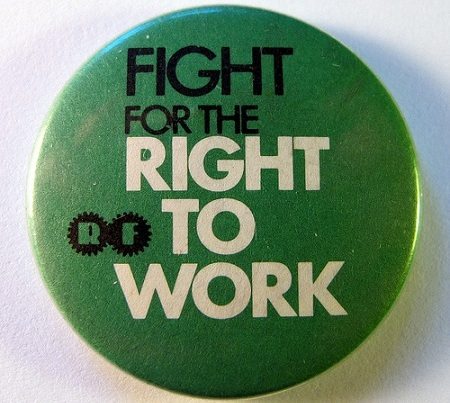
December 11, 2012; Source: Washington Post (Associated Press)
After a bitter debate that shows no sign of stopping, yesterday Michigan Gov. Rick Snyder (R) signed two bills that made Michigan the 24th state to enact a “right to work” law. It is noteworthy that Michigan, long a strong bastion of organized labor, is the first so-called “blue” state to do so. “Right to work” allows workers to join unions without having to pay union dues as part of their terms of employment.
Sign up for our free newsletters
Subscribe to NPQ's newsletters to have our top stories delivered directly to your inbox.
By signing up, you agree to our privacy policy and terms of use, and to receive messages from NPQ and our partners.
Appearing on “The Mike Huckabee Show,” Snyder contended that the laws shouldn’t have much impact on unions who are demonstrating their value to members. “…This should make them more responsive, because it really means that they have to be listening to workers more attentively and really presenting the value proposition to them,” Snyder said. “Because if they were doing all the things that workers were looking for, there shouldn’t be any difference with this legislation at all. Workers would simply choose to join the union, versus not choosing.”
Union leaders see it differently. United Auto Workers President Bob King told Politico, “I’m worried about the impact on society…They’re attacking everything that is good for working families.” AFL-CIO Union President Richard Trumka issued a statement calling attention to the concerns of protesters who surrounded the Capitol Building Michigan: “The people in the Capitol and around the state are demanding that legislators focus on an agenda that puts families and communities first, yet these Republican legislators and Gov. Rick Snyder and willing to put politics ahead of Michigan’s well-being.”
In a letter to the editor in the Muskegon Chronicle, Steve Keglovitz cut to the heart of union concerns, arguing that “right to work” should be called “right to work for less” because “that is exactly what happens in states that implement this language.” Research on the impacts of “right to work” laws has yielded results that both sides of the debate have used to support their arguments. For instance, a study from the Economic Policy Institute based on 2009 U.S. Census data found that workers in “right to work” states earn approximately $1,500 less per year than workers in states without such laws. But “right to work” supporters point to a study commissioned by the Indiana Chamber of Commerce that found that, from 1977 to 2008, employment grew 100 percent in “right to work” states as compared to 57 percent job growth in states without a “right to work” law.
While the debate over the impact of “right to work” rages on, it is clear that, unless the law is repealed, unions will likely need to increase their organizing efforts in Michigan and direct more resources toward targeting potential Michigan members for their support (as they have in other “right to work” states, such as Nevada). At the same time, it will be interesting to see whether the passage of “right to work” in a “blue” state with a history of a strong labor presence may have unintended consequences, perhaps yielding more involved union members in Michigan. After all, a perceived threat to an organization’s existence often acts as a catalyst to engage constituents more actively. –Mike Keefe-Feldman













